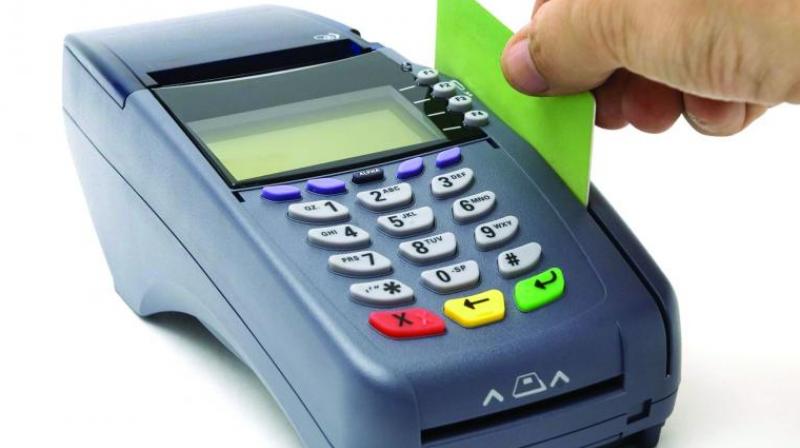Time to discard' anti consumer practices

You present your debit card after a meal at a restaurant or shopping at a mall, enter your PIN and get a text message from the bank confirming the transaction. But the Merchant Establishment at the Point of Sale (POS) claims the transaction failed even if you show him the debit message. You are forced to swipe your card a second time, which may fail again or pay cash. The merchant is expected to give you a slip as proof of the failed transaction. However, not everyone does this, citing a technical glitch. So you may end up making a double payment for the same transaction, with the vendor invariably assuring you that the money debited from your account for the failed transaction will be refunded by the bank in 48 hours. In reality, it takes at least a week for even verification, let alone refund to happen.
A card transaction may fail for several reasons. An incorrect PIN, an insufficient balance, damaged or expired card can be attributed to the customer. But usually, it's a fault with the POS machine or connectivity at the merchant’s end. Or a problem with the payment gateway or the bank's server. In some cases, even a fraud played by the merchant. These scenarios have a distinct anti consumer ring to them.
Why can’t the banks and merchants have a foolproof system where the actual reason for the failed or declined transaction is printed on the slip? Lack of transparency breeds deception and gives rise to untenable legal loopholes and inordinate delays.
With the government advocating digital payments, why can’t a failed transaction and resultant wrong debit have an immediate ‘bounce back’ effect? Why does the bank take a few days to a week or even more to reverse the entry? Or sometimes even to throw light on the actual status of a transaction? If the merchant has deceitfully collected double payment, why should the customer have to be disadvantaged by the lack of proof from the bank to lodge a criminal complaint of cheating on time under Section 420 of the Indian Penal Code? Is our technology so slow and so poor? The National Consumer Disputes Redressal Commission in State Bank of India Vs Dr J.C.S Kataky held that “once the complaint was made citing specific incidents of unauthorised withdrawal, it was the duty of the Bank to have carried out the necessary verification in the matter, rather than washing their hands off the whole episode.” The Commission went on to observe that “it is clear from the facts on record that the Bank flatly refused to even look into the matter, what to speak of making any investigation into the same. Once the specific POS number had been given in the message received from the Bank itself to the complainant, the Bank could have very well verified the genuineness of these transactions, after establishing contact with the person or merchant establishment in possession of the said POS, but nothing of that sort was done.”
The Compensation Policy (Banking Services) 2016 of SBI, for instance, under Clause 4.1 for erroneous debit, gives the bank 7 working days where no third party is involved to verify the transaction reported. Where third parties are involved, it gives itself a month for verification. Third parties are not from another planet and should be a call or email away. Do banks send communication through pigeons to justify such a long period?
Another sub clause states that where neither the bank is at fault nor the customer, but the fault lies elsewhere in the system, the bank will help in restoring the actual amount involved. But restoration can only take place after verification! Why should a consumer’s money be locked up for no fault of his? What about the interest on the money for this period? What if a customer has limited funds in his account which are erroneously debited twice at a business establishment and he has to buy medicines urgently or needs the money for an emergency? These should ideally be classic instances of deficiency in service and unfair trade practices under Sections 2(1)(g) and 2(1)(r) of the Consumer Protection Act for which a consumer can claim compensation for loss and mental agony suffered. The statute cries for suitable amendments to specifically include such scenarios.
The Haryana State Commission in Dr Subhash Chander Vs SBI referred to the Compensation Policy on fraudulent transactions which states that “the amount will be restored to the affected customer account without delay/demur, once the fraud is established.” But don't the words “with due verification” that follow, negate the “without delay” assurance?
This is where the National Payments Corporation of India (NPCI), an initiative of the Reserve Bank Of India (RBI) and Indian Banks Association (IBA) under the Payment and Settlement Systems Act, 2007, must live up to its lofty goal of ‘Customer Centricity’.
It strives to “pre-empt our customers’ future needs and expectations and bring about innovations in our products and services, in proactive anticipation even before the need has arisen.’ Before exclaiming ‘wow’, do read these feel good promises juxtaposed with the lopsided Terms & Conditions on the use of Cards by nationalised banks! For a start, how about a simple system of immediate bounce back in failed debit card transactions?
(The writer is an advocate at the Madras high court, columnist & author)

